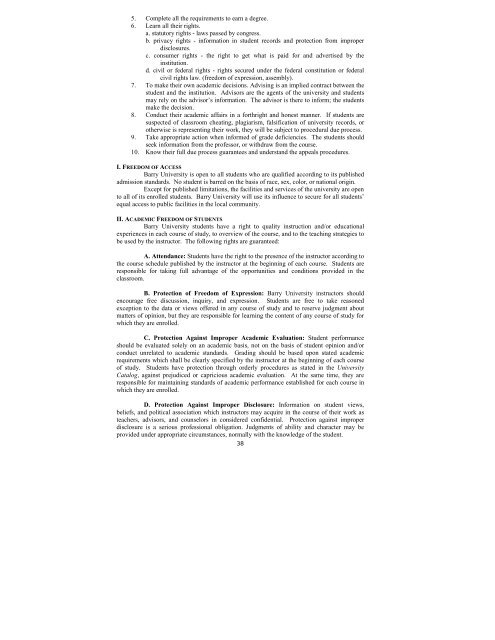Dr. Lin's Instructional Web - Barry University
Dr. Lin's Instructional Web - Barry University
Dr. Lin's Instructional Web - Barry University
Create successful ePaper yourself
Turn your PDF publications into a flip-book with our unique Google optimized e-Paper software.
5. Complete all the requirements to earn a degree.<br />
6. Learn all their rights.<br />
a. statutory rights - laws passed by congress.<br />
b. privacy rights - information in student records and protection from improper<br />
disclosures.<br />
c. consumer rights - the right to get what is paid for and advertised by the<br />
institution.<br />
d. civil or federal rights - rights secured under the federal constitution or federal<br />
civil rights law. (freedom of expression, assembly).<br />
7. To make their own academic decisions. Advising is an implied contract between the<br />
student and the institution. Advisors are the agents of the university and students<br />
may rely on the advisor’s information. The advisor is there to inform; the students<br />
make the decision.<br />
8. Conduct their academic affairs in a forthright and honest manner. If students are<br />
suspected of classroom cheating, plagiarism, falsification of university records, or<br />
otherwise is representing their work, they will be subject to procedural due process.<br />
9. Take appropriate action when informed of grade deficiencies. The students should<br />
seek information from the professor, or withdraw from the course.<br />
10. Know their full due process guarantees and understand the appeals procedures.<br />
I. FREEDOM OF ACCESS<br />
<strong>Barry</strong> <strong>University</strong> is open to all students who are qualified according to its published<br />
admission standards. No student is barred on the basis of race, sex, color, or national origin.<br />
Except for published limitations, the facilities and services of the university are open<br />
to all of its enrolled students. <strong>Barry</strong> <strong>University</strong> will use its influence to secure for all students’<br />
equal access to public facilities in the local community.<br />
II. ACADEMIC FREEDOM OF STUDENTS<br />
<strong>Barry</strong> <strong>University</strong> students have a right to quality instruction and/or educational<br />
experiences in each course of study, to overview of the course, and to the teaching strategies to<br />
be used by the instructor. The following rights are guaranteed:<br />
A. Attendance: Students have the right to the presence of the instructor according to<br />
the course schedule published by the instructor at the beginning of each course. Students are<br />
responsible for taking full advantage of the opportunities and conditions provided in the<br />
classroom.<br />
B. Protection of Freedom of Expression: <strong>Barry</strong> <strong>University</strong> instructors should<br />
encourage free discussion, inquiry, and expression. Students are free to take reasoned<br />
exception to the data or views offered in any course of study and to reserve judgment about<br />
matters of opinion, but they are responsible for learning the content of any course of study for<br />
which they are enrolled.<br />
C. Protection Against Improper Academic Evaluation: Student performance<br />
should be evaluated solely on an academic basis, not on the basis of student opinion and/or<br />
conduct unrelated to academic standards. Grading should be based upon stated academic<br />
requirements which shall be clearly specified by the instructor at the beginning of each course<br />
of study. Students have protection through orderly procedures as stated in the <strong>University</strong><br />
Catalog, against prejudiced or capricious academic evaluation. At the same time, they are<br />
responsible for maintaining standards of academic performance established for each course in<br />
which they are enrolled.<br />
D. Protection Against Improper Disclosure: Information on student views,<br />
beliefs, and political association which instructors may acquire in the course of their work as<br />
teachers, advisors, and counselors in considered confidential. Protection against improper<br />
disclosure is a serious professional obligation. Judgments of ability and character may be<br />
provided under appropriate circumstances, normally with the knowledge of the student.<br />
38



